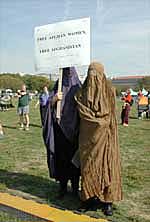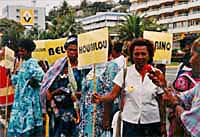April 2002 - Snapshots of Home and Elsewhere - Asia-Oceania
 |
|
On September 11, 2001, the situation of Afghan women suddenly took centre stage. All women's movements condemned the attacks, called for peace and mobilized to increase efforts to defend women in this country. Women's resistance groups in neighbouring countries, Pakistan, in particular, have waged this campaign from the beginning. Violence and the social condition of women were the focus of actions conducted in this country. In New Zealand, women of the teachers' union initiated a project known as NZEI Te Riu Roa or "Water to Learn." The goal of this project is to finance safe drinking water for a school or children's centre in the Pacific. Freed of the task of fetching water, girls have the time to go to school.
In Fiji, where there was a coup d'état in 2000, women concentrated on gathering signatures. Finally, Australian women carried out a wide variety of actions: music and dance festivals, picnics, and a virtual bus tour on wife assault. Women denounced poverty, calling for "fair trade," and they demanded the respect of labour rights and a denuclearized Pacific.
|
|
|
Copyrights
:
CC by-nc-sa 2.0
Last modified 2006-03-23 03:09 PM This item is available in Français, English, Español |




